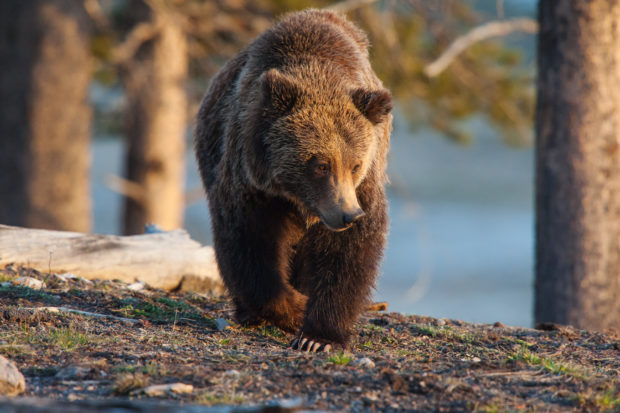
Each year, thousands of tourists flock to British Columbia’s lush forests to participate in grizzly-bear-viewing expeditions. The bear-viewing industry brings in 12 times more direct revenue to the province than trophy hunting.
Photo by Tom Mangelsen/www.mangelsen.com
British Columbia’s newly formed government, responding to the will of an overwhelming majority of the province’s citizens and following through on its own campaign promise, announced a ban on all trophy hunting of grizzly bears there, starting in November.
Under the prior Liberal government, B.C. had become the world’s grizzly-bear-hunting hub, with trophy hunters killing 250 of the great bears a year, even within renowned provincial parks and protected areas and, most brazenly, in the Great Bear Rainforest, where Coastal First Nations have vehemently opposed trophy hunting of bears.
This is a signature win for animal protection groups (including Humane Society International/Canada, which worked for this outcome), and for the more than 90 percent of B.C. residents who opposed trophy hunting. Polling revealed that opponents of the practice include an overwhelming majority of residents of rural communities with strong hunting traditions. All of this is an emphatic reminder to the U.S. government and to our northern Rockies states not to proceed with a trophy hunt for grizzly bears in the Greater Yellowstone ecosystem, which may be enabled with the recent delisting of bears there from the ranks of threatened and endangered species.
There is no justification for the cruelty of trophy hunting, and the utterly gratuitous nature of the killing. In 2015, the world watched in horror as a video showed a wounded grizzly bear thrashing in agony as she tumbles down a hill, her blood smearing the snow, while the men who shot her cheer the outcome. Other, similarly jarring videos, showing wounded bears suffering in agony while trophy hunters rejoice, live on YouTube for anyone to see.
It’s not just a moral issue, it’s also an economic one. Each year, thousands flock to B.C.’s lush forests to participate in grizzly-bear-viewing expeditions. The bear-viewing industry brings in 12 times more direct revenue to the province than trophy hunting. There are millions of people throughout North America and the world who’d pay handsomely for an opportunity to see a grizzly in the wild, while only a few thousand people wish to slay these bears as a head-hunting exercise. The economic potential of an industry built around bear watching is vast, while the killing industry is small and receding and also a threat to the larger wildlife-watching enterprise.
HSI/Canada has worked for more than a decade to bring down the trophy hunting industry in British Columbia and other provinces. More than 10,000 supporters of HSI/Canada signed a letter to B.C. premier Christy Clark, asking her to ban the hunt, and HSI, with other partners, participated in the delivery of over 70,000 signatures to the B.C. legislature in April, calling for a ban on grizzly bear trophy hunting. While much remains to be clarified about the recent announcement, HSI is determined to work with the B.C. government to ensure that grizzlies are truly protected from all forms of trophy hunting.
This victory for grizzlies comes close on the heels of other notable wins wildlife in the past couple of weeks. Earlier this month, the U.S. Court of Appeals for the District of Columbia ruled that federal protections for wolves under the Endangered Species Act should be maintained for 4,000 or so wolves inhabiting the northern reaches of the boreal forests of Minnesota, Wisconsin, and Michigan. Also on Monday, the U.S. Court of Appeals for the Fourth Circuit ruled that Endangered Species Act protections clearly extend to grizzly bears kept in captivity, even though those facilities also must meet the minimum standards of humane treatment set by the U.S. Department of Agriculture under the Animal Welfare Act, as advocated by HSUS attorneys in an amicus curiae brief. On Friday, Illinois became the first state in the United States to ban the use of elephants in circuses and other traveling acts, when Gov. Bruce Rauner signed a landmark bill prohibiting this practice. And on August 1, the Czech Republic became the latest country to ban fur farming, a policy that, when it takes effect, will spare 20,000 foxes and mink from being raised and killed for the fur trade.
These are all indicators that the world is waking up to the plight of animals. Our task is far from complete, but these wins should stir the hopes of all of us who imagine a day when we recognize the rightful place of other creatures on our planet and treat them with respect and dignity.
The post British Columbia’s hunting ban on grizzlies the latest in rapid-fire series of gains for animals appeared first on A Humane Nation.
Enviroshop is maintained by dedicated NetSys Interactive Inc. owners & employees who generously contribute their time to maintenance & editing, web design, custom programming, & website hosting for Enviroshop.
